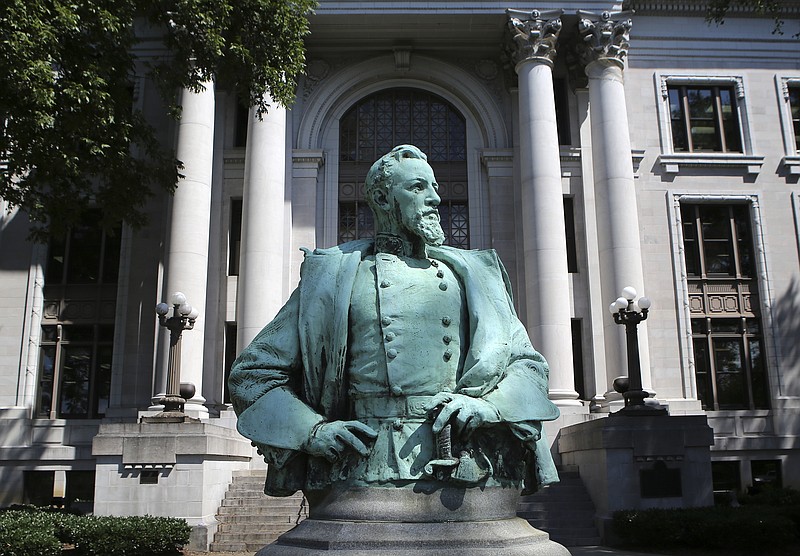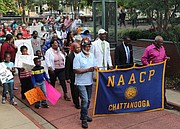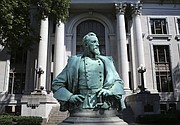Wednesday around lunch, a couple of hours after the Hamilton County Commission voted down removing the statue of Confederate Gen. A.P Stewart from the courthouse lawn, I spent an hour looking at the monument.
I wondered what A.P would have said about the people speaking passionately - including one of his descendants - to the commission about what Civil War relics mean to them.
Words like racism. Hatred. Slavery. Traitor.
I wonder what A.P. would remember about his more than a century sitting on the lawn. He watched recently as a gas station became a trendy lunch spot and downtown offices became swanky salons.
He was there in the early 1980s when they named Martin Luther King Jr. Boulevard. The Hoffa trial. The riots in the early 1970s. The transition from smoke-laden afterthought to a modern-day downtown revitalization story.
I wonder if, given a brief moment of life, would he shoo the stupid pigeons. Or would he shake his head at the transportation transformation from horses and buggies to cars running on electricity to the occasional weekend reappearance of the horse and buggy. Maybe he would offer a stern warning for those dang young kids to stay off his grass.
A.P.'s ride has been improbable. As one of two statues on courthouse grounds - the other being Cherokee Chief John Ross - he probably would be quick to remind those protesting his presence that of the two, he was the one who did not own slaves.
A.P.'s creation was the work of a group that was certainly the target of unfairness and discrimination in their time. He was dedicated by the Daughters of the Confederacy in 1916, four years before women got the right to vote.
And to be fair, I would like to ask him how many people knew who he was or what he accomplished before the hubbub about removing him began.
My guess is not many. I know I was not aware of his place, and his recent priority for members of the NAACP.
"Right now this is a local issue and can be handled by a local vote," local NAACP executive board member and longtime Chattanooga public servant Yusuf Hakeem told county commissioners with almost a dozen supporters standing behind him.
Afterward, Hakeem made it clear that Wednesday's vote for Stewart staying will not be the last word on the matter and that he could see the national NAACP taking an interest in the issue.
"It's a process. Our next step is the local state legislators," he said. "We are going to build a case."
The case is pretty simple.
"How much history do you want to remember?" Commissioner Greg Beck asked his fellow commissioners who were about to vote, "because we don't want to remember slavery, and we don't want to remember the hatred."
The talking points of history against hatred may simplify this issue, whether A.P. knew it then or not.
Winners write the history, but the narratives, good and bad, are worth remembering, too.
It's also important to know that these dividing lines - be they racial or economical or political - are no longer starting points as much as they are cliffs.
There is no meeting in the middle when discussion and, most importantly, listening become diatribes and lectures.
A.P. has been there 100 years with C.S.A under his name on the six-ton marble base, and Beck and several hundreds of others have worked in the courthouse for years, before Wednesday's official vote.
Why the outrage now seems like a fair question.
Want another? Why not move A.P. to the entrance of Chickamauga and Chattanooga National Military Park, which he helped establish and served for 25 years? It makes perfect sense, too much sense really.
This seems like all-too-many of today's social fights in which the hard-and-fast lines now are so pronounced that doing something for the other side, even if it makes the most sense, looks like a loss.
And that's a shame.
I asked a friend of mine what they thought of this, and their response was pretty sharp.
"Seems like the county commission would have better and more important things to do," was the answer.
We're pretty sure even ol' A.P. Stewart would agree with that, especially if they could do something about those stupid pigeons.
Contact Jay Greeson at jgreeson@timesfreepress.com and 423-757-6343.



